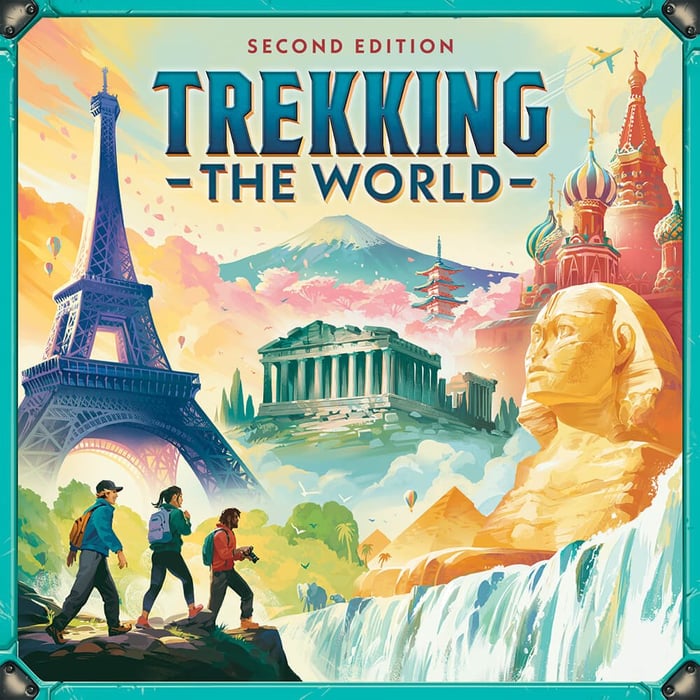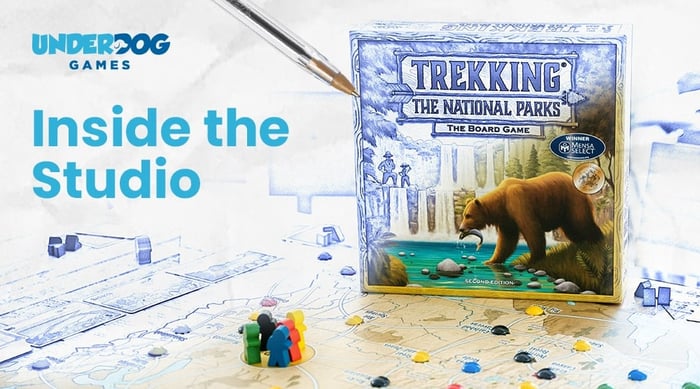Welcome to this week's behind-the-scenes post. Today's is about one of the most amorphous game design concepts: variety.

Varieties of Variety
Players say they want variety in strategy games.
But what that means isn't clear, because "variety" a catch-all term referring to multiple things. To design them into games, we have to be explicit about what they are.
As a game designer desperate to make not-awful games, I now rely on a list of multiple kinds of variety. When I design a game, I try to build all in.
I thought it might be interesting to go through the list and reflect on how each kind of variety manifests Trekking the World 2nd Edition, our latest game (and a complete mechanical overhaul).
In the list below, the words in the italics define each type of variety, and the rest explains how it manifests in our game. Here we go:

1. Turn-to-turn reward-type variety
You can think of a strategy game as a reward system for action. One type of variety is the variety of rewards you get for your actions. Example: in one instance you get an extra action, another time you might get points or a special token, etc.
I'm covering this one first because, in Trekking the World 2nd Edition, many of the other types of variety unfold from this one.
I asked a fellow designer who'd told me it's his favorite of our games why he liked it. He said "you get stuff every turn." - I liked to hear that because a) it was intentional; and b) it's a reflection of reward-type variety.
You can feel rewarded with the following things during play:
- money
- movement power (on a map)
- souvenirs, which earn you points and other things.
- "Encounter" cards with special rule-bending powers on them, as well as points. These cards are also differentiated among themselves, in terms of the types of the rewards they give you.
- 4 types of "Itinerary Tokens" which enhance your travel itineraries in distinct ways
- "Tour" cards, which give you points.
The roles all these things play in the game are different from one another, which helps keep the feeling of reward differentiated.
2. Turn-to-turn reward-size variety
A century cognitive science says the most compelling reward systems offer rewards in a variety of sizes. So, some turns should yield "small" rewards, but at least a few should make you feel like you hit the jackpot.
Among the things you can accumulate in Trekking the World 2nd Edition, some you can also spend. Importantly, you can "save up" those things and spend them all at once in a synergistic way to pull off big turns. For example, you can save up multiple Encounter cards and spend them to combo together into big effects. You can also spend a bunch of Itinerary Tokens at once, in combination with each other and/or Encounter cards.
3. Turn-to-turn option variety
Does it feel like I can do meaningfully different things on different turns?
On each turn in Trekking the World 2nd Edition, you choose an itinerary that affords you different travel options. This is a minor kind of turn-to-turn option variety. But it compounds when integrated with another source of turn-to-turn option variety: the Encounter cards and Itinerary Tokens that you accumulate can dramatically change what's possible to do on a turn.
4. Game-to-Game strategic variety:
Can your approach to winning meaningfully change from game-to-game?
In Trekking the World 2nd Edition, here are the strategies I've seen work:
- focus on collecting and comboing Encounter powers
- focus on souvenirs for points and powerful Itinerary Tokens;
- focus on getting and spending money fast, to rush the end before others make themselves too powerful
- collect special "catchup" Encounter powers and "slingshot" from behind.
5. Game-to-Game situational variety
Do the things that happen in one game feel significantly different than what happen in the next?
Each time you play, only a subset of the game's total Encounter cards are used. Because these cards bend the rules, the rules bend in different ways each time you play. In addition, the strategic variety mentioned above boosts situational variety, since the situations you face depend on your opponents' strategic approach.
---------------------------------
As you may have noticed, many of the kinds of variety in Trekking the World 2nd Edition depend on Encounter cards and Itinerary Tokens, two things that didn't exist in the 1st Edition. We hope players will experience this as improvement in multiple kinds of variety.
It'll be interesting to revisit this later to see if that's true.
Please don't hesitate to share your opinions in a reply, positive or negative. I read all your replies (and reply when time permits) and it helps me understand what we're doing right and wrong.
Nick Bentley,
President, Underdog Games Studio


